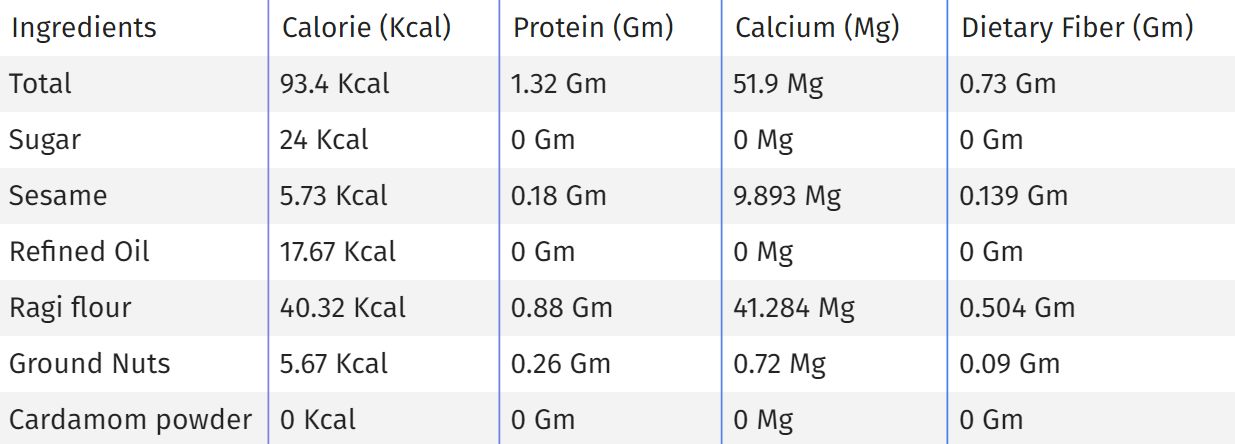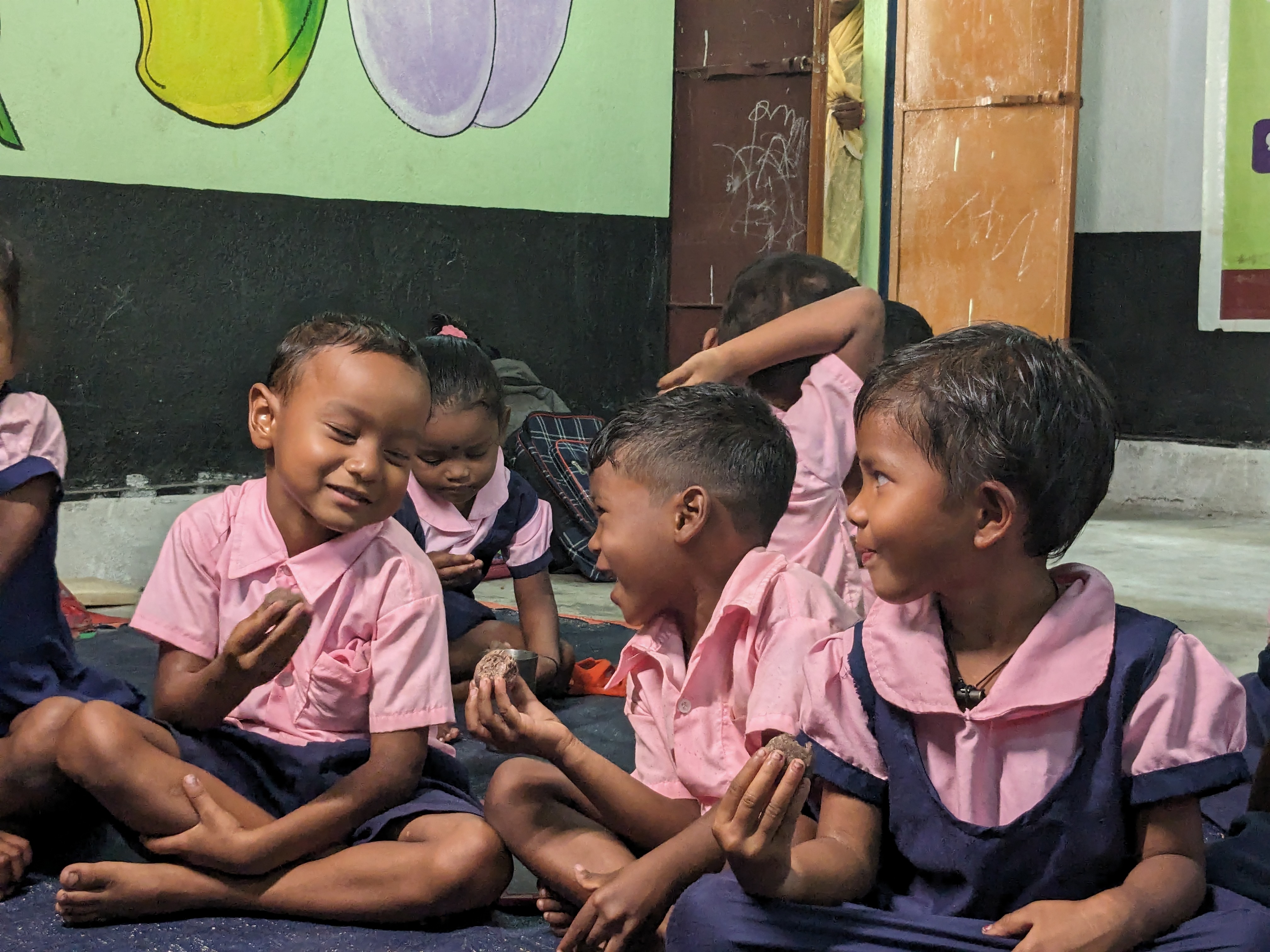Malnutrition remains a significant issue in Kendujhar district, Odisha. According to the National Family Health Survey-5, approximately 33 percent of children under the age of five exhibit stunting, indicative of chronic malnutrition in Kendujhar. Additionally, 45 percent of children in the same age group are underweight. The situation is further exacerbated by anemia, with more than 70 percent of children and over 60 percent of women in the district being anemic. These alarming statistics reflect the deep-rooted problems of poverty and limited access to nutritious food.
A millet-based diet can substantially enhance children's health and nutrition by providing essential nutrients such as protein, fibre, vitamins, and minerals like iron and calcium. These nutrients are crucial for a child's growth, cognitive development, and immune system. Millets are also gluten-free and easy to digest, making them ideal for children. Consuming millet-based food like ragi ladoo can help combat malnutrition, improve bone health, and ensure steady energy levels. In regions where malnutrition is prevalent, incorporating millets into the diet can offer a sustainable solution to improve overall child health and development.
In Odisha’s Kendujhar district, a women’s self-help group has addressed malnutrition through the introduction of nutrient-rich millet-based diets for the preschool children under the integrated child development scheme.
A women-owned millet enterprise is tackling nutritional deficiencies
The Radha Krishna women's self-help group in Kendujhar district, Odisha, serves as a remarkable example of how determination and the effective use of humble millets can combat malnutrition. Their efforts have been supported by Shree Anna Abhiyan, a flagship program initiated by the Department of Agriculture and Farmers' Empowerment, Odisha, in partnership with the Mission Shakti Department and the District Mineral Foundation.
The Radha Krishna SHG's journey commenced with the ambitious goal of producing a nutritious snack for pre-school children enrolled in Anganwadi Centres and Scheduled Caste and Scheduled Tribe Development Department Schools, as part of the Integrated Child Development Scheme.
Recognising the vital role of nutrition in early childhood, particularly in a region where children suffer from malnutrition, Shree Anna Abhiyan identified millet-based foods as a crucial addition to the Integrated Child Development Scheme. The Radha Krishna women's self-help group was selected by the Mission Shakti Department to prepare ragi ladoo mix due to their relevant experience in producing chatua, a traditional snack made from dry-roasted cashew, almond, millet, barley, and chickpea. The women's self-help group established a ragi ladoo processing unit in July 2020. Their dedication and hard work paid off as they began supplying ragi ladoo mix to 343 Anganwadi Centres and 37 Scheduled Caste and Scheduled Tribe Development Department Schools, reaching over 12,000 children.
“As children have a natural love for sweets, ragi ladoo satisfies their taste buds and also provides essential nutrition for their development and a strong body,” said Sabita Naik, Anganwadi Worker at Keutasahi in Sadar Block, Kendujhar.
Nutritional value in ragi ladoo

Visible impacts
Previously, the women's self-help group was generating a modest income of approximately Rs. 20,000 per month from chatua. The ragi ladoo program enabled their earnings to increase substantially to Rs. 60,000 per month. This brought economic stability and significantly improved their quality of life. Beyond financial gain, the women acquired valuable skills in business management and millet processing, enhancing their operations and establishing themselves as successful women entrepreneurs and community leaders.
Mamata Mohanta, a member of the women's self-help group, exemplifies this spirit of resilience. After the loss of her husband during the COVID-19 pandemic, she became the sole breadwinner for her family. "In my initial days after joining the women's self-help group, I used to assist other women's self-help group members in maintaining cash books and bankbooks, which provided me with additional income. However, now, the opportunity to work at the ragi ladoo processing unit has not only given me financial stability but has also instilled in me a renewed sense of purpose and financial independence," said a beaming Mamata. Her daughter is currently studying in the 12th grade and preparing for her entrance examination for Delhi University, while her younger son is in the 5th grade.
Mamata also shared her personal health challenges. She underwent heart surgery in 2022. Following her doctor's advice to consume millet-based foods, she observed a significant improvement in her health. This experience ignited her passion for promoting the nutritional benefits of millets, particularly for vulnerable groups such as children, pregnant women, and lactating women.
The resilience and determination demonstrated by Mamata mirrored the collective spirit of the Radha Krishna women's self-help group. Through ongoing capacity building, the women enhanced their processing skills, constructed their own storage facilities, and further increased their production capabilities. Their first flight to Mysore for a training program on millet-based food items, focussing on retaining nutritional value, adhering to hygiene standards, and perfecting recipes, marked another significant milestone in their journey.

The ragi ladoo program gained national recognition. The Government of India and NITI Aayog acknowledged the decentralised model of millet production, processing, and distribution implemented in Kendujhar district. The Radha Krishna women's self-help group's story is a powerful testament to how a sustainable program, coupled with the determination and hard work of local women's groups, can lead to transformative change. Their achievements alleviated the economic hardship of women and served as an inspiration to others, demonstrating that with the right support and collective will, sustainable development and empowerment are achievable.
Shishir Kumar Sarangi, the District Project Coordinator with Mission Shakti in Kendujhar, stated, "The members of the Radha Krishna self-help group have become true changemakers, transforming their community by promoting millet-based products and enhancing both nutrition and financial stability through their dedicated efforts."
The resilience of millets to thrive in extreme climate conditions, combined with their high nutritional value, makes them a climate-smart crop for vulnerable small-scale farmers in rainfed areas.
"Millet-based enterprises led by local women's groups could harness the potential of these mighty crops, boost millet production, and promote sustainable agriculture," said Satyajit Samal, the District Project Manager of Shree Anna Abhiyan, who works with the Watershed Support Services and Activities Network (WASSAN) in Kendujhar. WASSAN serves as the program secretariat that anchors the Shree Anna Abhiyan in Odisha.
Author: Rajesh Kumar Pradhan works as a Young Professional with Watershed Support Services and Activities Network in Kendujhar district, Odisha.
/articles/millets-malnutrition-women-led-initiative